Analyzing Poverty in Canada: Causes, Effects, and Government Response
VerifiedAdded on 2023/05/28
|5
|1046
|180
Essay
AI Summary
This essay provides an in-depth analysis of poverty in Canada, defining poverty and exploring its various dimensions. It examines the causes of poverty, including economic factors, social stigmas, and vulnerabilities, while also delving into the effects of poverty on individuals and society. The essay highlights the challenges in measuring poverty in Canada and discusses the disparities across different groups, such as Aboriginal Canadians, immigrants, and children. It references reports from Statistics Canada and UNICEF to illustrate the severity of child poverty and Canada's ranking among economically advanced countries. The essay concludes by emphasizing the need for greater government attention and resource allocation to address the issue of poverty in Canada, particularly concerning children.
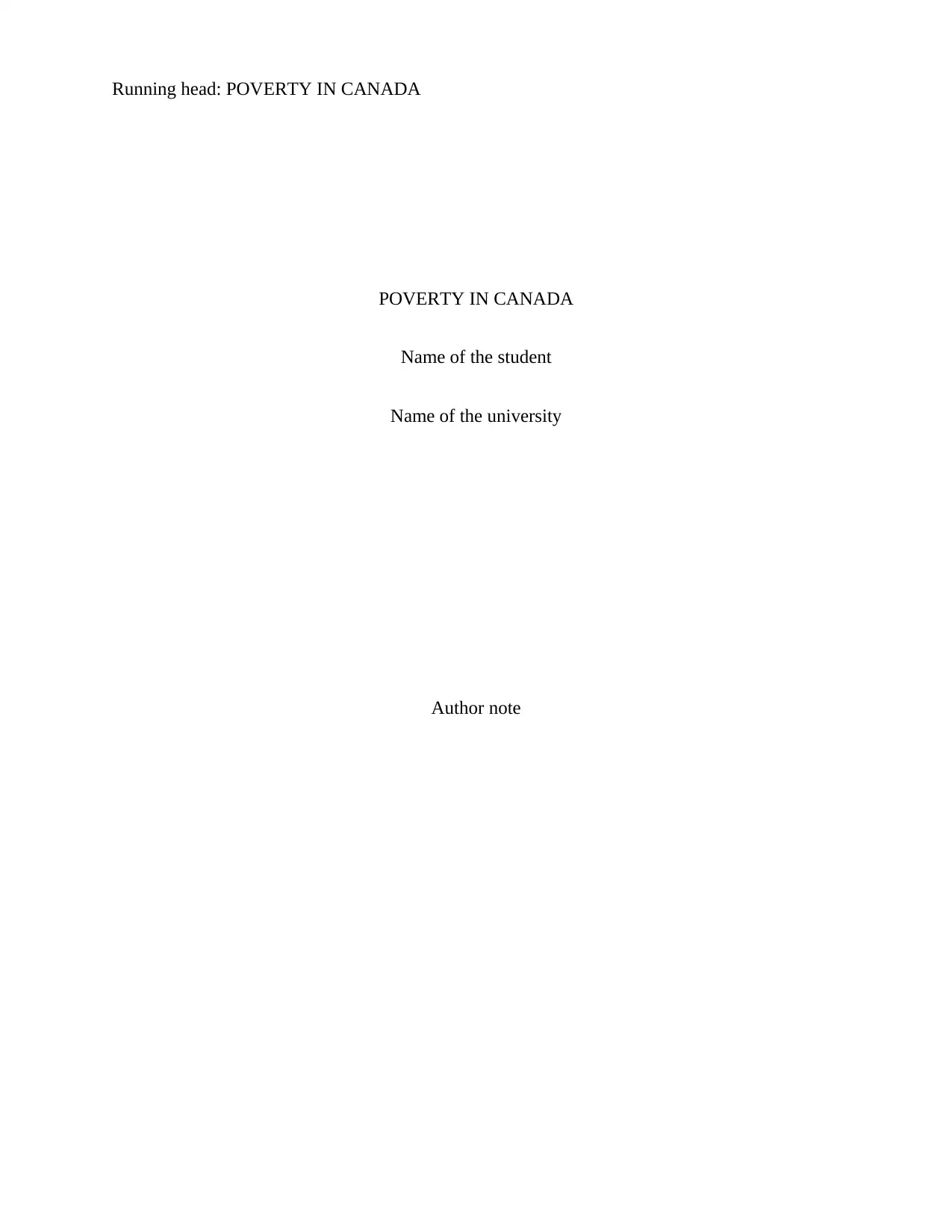
Running head: POVERTY IN CANADA
POVERTY IN CANADA
Name of the student
Name of the university
Author note
POVERTY IN CANADA
Name of the student
Name of the university
Author note
Paraphrase This Document
Need a fresh take? Get an instant paraphrase of this document with our AI Paraphraser
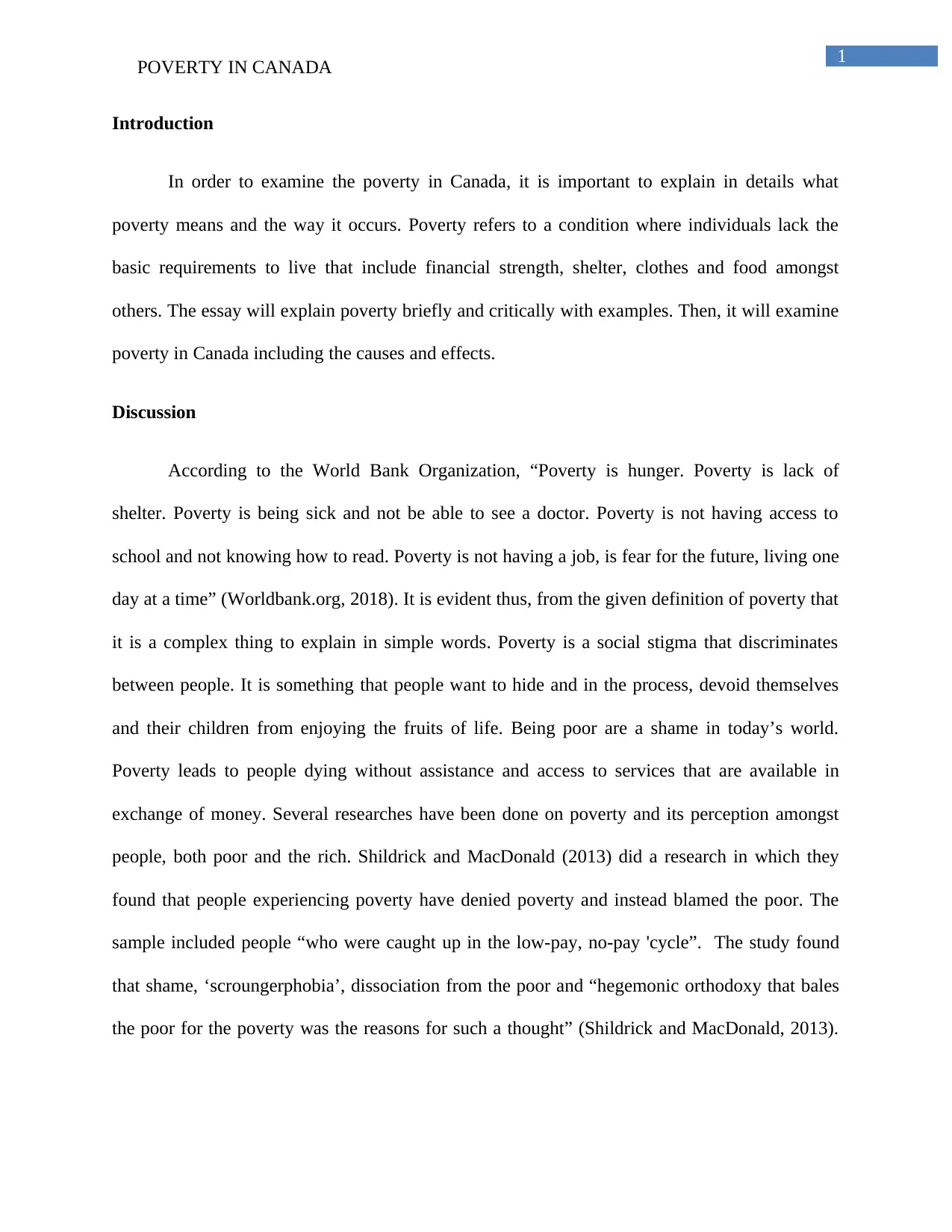
1
POVERTY IN CANADA
Introduction
In order to examine the poverty in Canada, it is important to explain in details what
poverty means and the way it occurs. Poverty refers to a condition where individuals lack the
basic requirements to live that include financial strength, shelter, clothes and food amongst
others. The essay will explain poverty briefly and critically with examples. Then, it will examine
poverty in Canada including the causes and effects.
Discussion
According to the World Bank Organization, “Poverty is hunger. Poverty is lack of
shelter. Poverty is being sick and not be able to see a doctor. Poverty is not having access to
school and not knowing how to read. Poverty is not having a job, is fear for the future, living one
day at a time” (Worldbank.org, 2018). It is evident thus, from the given definition of poverty that
it is a complex thing to explain in simple words. Poverty is a social stigma that discriminates
between people. It is something that people want to hide and in the process, devoid themselves
and their children from enjoying the fruits of life. Being poor are a shame in today’s world.
Poverty leads to people dying without assistance and access to services that are available in
exchange of money. Several researches have been done on poverty and its perception amongst
people, both poor and the rich. Shildrick and MacDonald (2013) did a research in which they
found that people experiencing poverty have denied poverty and instead blamed the poor. The
sample included people “who were caught up in the low-pay, no-pay 'cycle”. The study found
that shame, ‘scroungerphobia’, dissociation from the poor and “hegemonic orthodoxy that bales
the poor for the poverty was the reasons for such a thought” (Shildrick and MacDonald, 2013).
POVERTY IN CANADA
Introduction
In order to examine the poverty in Canada, it is important to explain in details what
poverty means and the way it occurs. Poverty refers to a condition where individuals lack the
basic requirements to live that include financial strength, shelter, clothes and food amongst
others. The essay will explain poverty briefly and critically with examples. Then, it will examine
poverty in Canada including the causes and effects.
Discussion
According to the World Bank Organization, “Poverty is hunger. Poverty is lack of
shelter. Poverty is being sick and not be able to see a doctor. Poverty is not having access to
school and not knowing how to read. Poverty is not having a job, is fear for the future, living one
day at a time” (Worldbank.org, 2018). It is evident thus, from the given definition of poverty that
it is a complex thing to explain in simple words. Poverty is a social stigma that discriminates
between people. It is something that people want to hide and in the process, devoid themselves
and their children from enjoying the fruits of life. Being poor are a shame in today’s world.
Poverty leads to people dying without assistance and access to services that are available in
exchange of money. Several researches have been done on poverty and its perception amongst
people, both poor and the rich. Shildrick and MacDonald (2013) did a research in which they
found that people experiencing poverty have denied poverty and instead blamed the poor. The
sample included people “who were caught up in the low-pay, no-pay 'cycle”. The study found
that shame, ‘scroungerphobia’, dissociation from the poor and “hegemonic orthodoxy that bales
the poor for the poverty was the reasons for such a thought” (Shildrick and MacDonald, 2013).
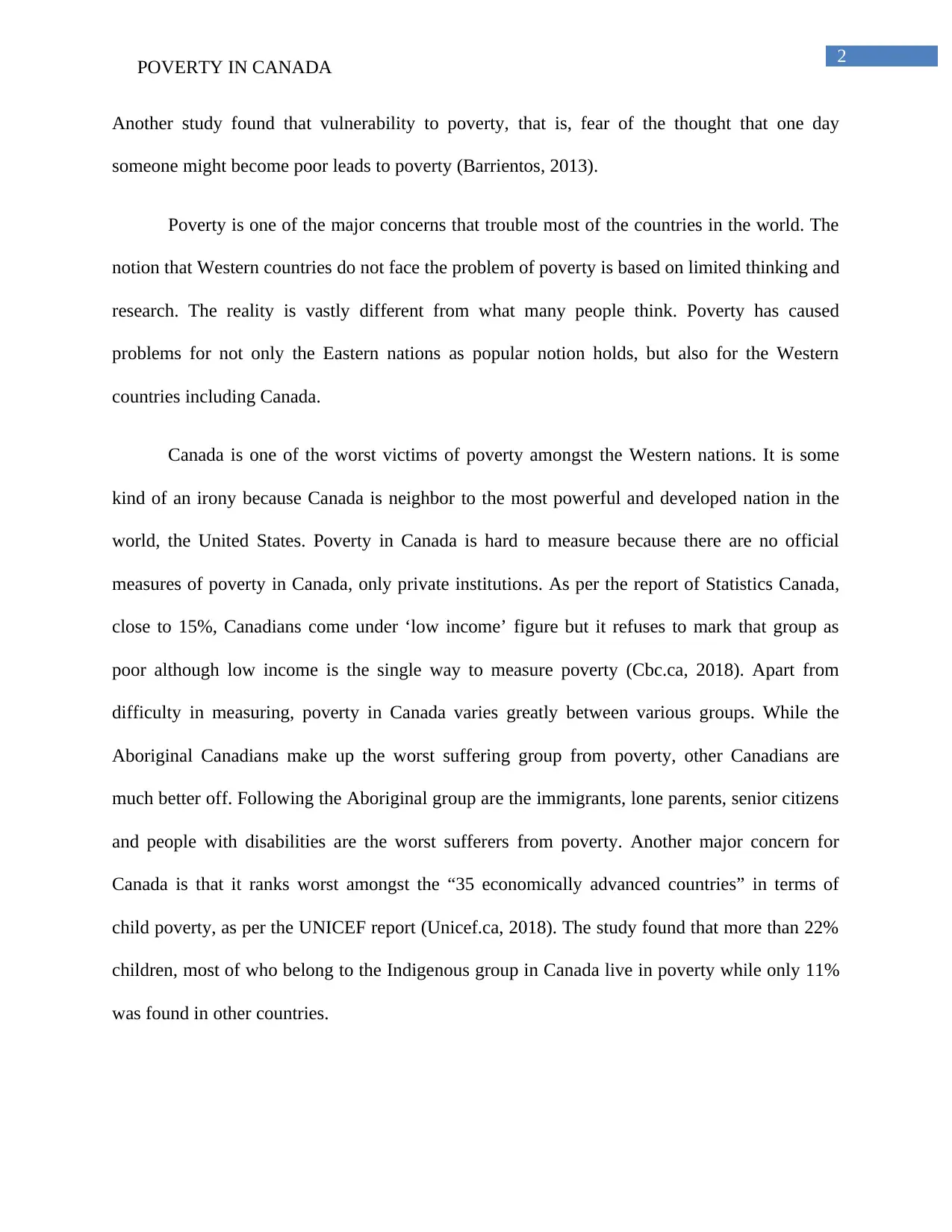
2
POVERTY IN CANADA
Another study found that vulnerability to poverty, that is, fear of the thought that one day
someone might become poor leads to poverty (Barrientos, 2013).
Poverty is one of the major concerns that trouble most of the countries in the world. The
notion that Western countries do not face the problem of poverty is based on limited thinking and
research. The reality is vastly different from what many people think. Poverty has caused
problems for not only the Eastern nations as popular notion holds, but also for the Western
countries including Canada.
Canada is one of the worst victims of poverty amongst the Western nations. It is some
kind of an irony because Canada is neighbor to the most powerful and developed nation in the
world, the United States. Poverty in Canada is hard to measure because there are no official
measures of poverty in Canada, only private institutions. As per the report of Statistics Canada,
close to 15%, Canadians come under ‘low income’ figure but it refuses to mark that group as
poor although low income is the single way to measure poverty (Cbc.ca, 2018). Apart from
difficulty in measuring, poverty in Canada varies greatly between various groups. While the
Aboriginal Canadians make up the worst suffering group from poverty, other Canadians are
much better off. Following the Aboriginal group are the immigrants, lone parents, senior citizens
and people with disabilities are the worst sufferers from poverty. Another major concern for
Canada is that it ranks worst amongst the “35 economically advanced countries” in terms of
child poverty, as per the UNICEF report (Unicef.ca, 2018). The study found that more than 22%
children, most of who belong to the Indigenous group in Canada live in poverty while only 11%
was found in other countries.
POVERTY IN CANADA
Another study found that vulnerability to poverty, that is, fear of the thought that one day
someone might become poor leads to poverty (Barrientos, 2013).
Poverty is one of the major concerns that trouble most of the countries in the world. The
notion that Western countries do not face the problem of poverty is based on limited thinking and
research. The reality is vastly different from what many people think. Poverty has caused
problems for not only the Eastern nations as popular notion holds, but also for the Western
countries including Canada.
Canada is one of the worst victims of poverty amongst the Western nations. It is some
kind of an irony because Canada is neighbor to the most powerful and developed nation in the
world, the United States. Poverty in Canada is hard to measure because there are no official
measures of poverty in Canada, only private institutions. As per the report of Statistics Canada,
close to 15%, Canadians come under ‘low income’ figure but it refuses to mark that group as
poor although low income is the single way to measure poverty (Cbc.ca, 2018). Apart from
difficulty in measuring, poverty in Canada varies greatly between various groups. While the
Aboriginal Canadians make up the worst suffering group from poverty, other Canadians are
much better off. Following the Aboriginal group are the immigrants, lone parents, senior citizens
and people with disabilities are the worst sufferers from poverty. Another major concern for
Canada is that it ranks worst amongst the “35 economically advanced countries” in terms of
child poverty, as per the UNICEF report (Unicef.ca, 2018). The study found that more than 22%
children, most of who belong to the Indigenous group in Canada live in poverty while only 11%
was found in other countries.
⊘ This is a preview!⊘
Do you want full access?
Subscribe today to unlock all pages.

Trusted by 1+ million students worldwide
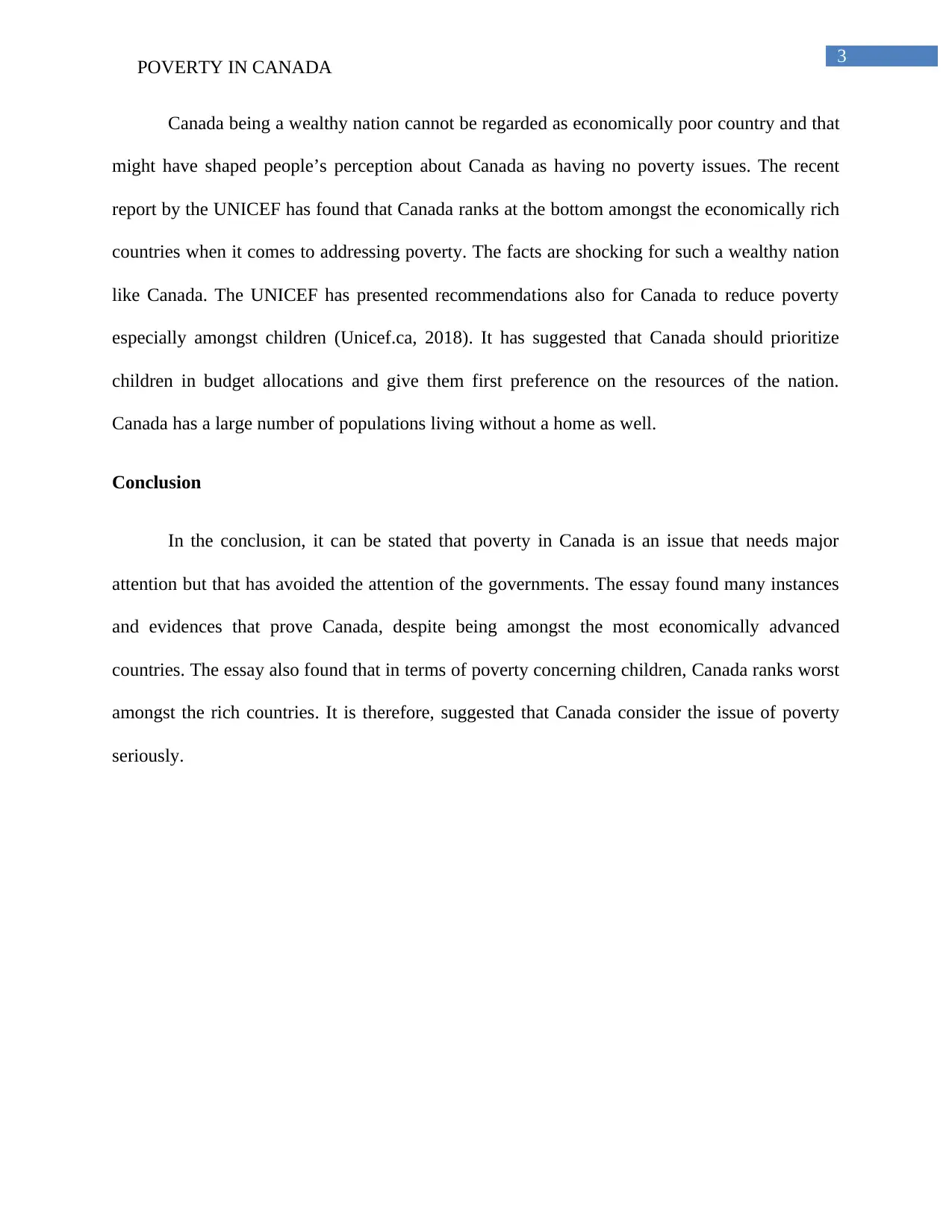
3
POVERTY IN CANADA
Canada being a wealthy nation cannot be regarded as economically poor country and that
might have shaped people’s perception about Canada as having no poverty issues. The recent
report by the UNICEF has found that Canada ranks at the bottom amongst the economically rich
countries when it comes to addressing poverty. The facts are shocking for such a wealthy nation
like Canada. The UNICEF has presented recommendations also for Canada to reduce poverty
especially amongst children (Unicef.ca, 2018). It has suggested that Canada should prioritize
children in budget allocations and give them first preference on the resources of the nation.
Canada has a large number of populations living without a home as well.
Conclusion
In the conclusion, it can be stated that poverty in Canada is an issue that needs major
attention but that has avoided the attention of the governments. The essay found many instances
and evidences that prove Canada, despite being amongst the most economically advanced
countries. The essay also found that in terms of poverty concerning children, Canada ranks worst
amongst the rich countries. It is therefore, suggested that Canada consider the issue of poverty
seriously.
POVERTY IN CANADA
Canada being a wealthy nation cannot be regarded as economically poor country and that
might have shaped people’s perception about Canada as having no poverty issues. The recent
report by the UNICEF has found that Canada ranks at the bottom amongst the economically rich
countries when it comes to addressing poverty. The facts are shocking for such a wealthy nation
like Canada. The UNICEF has presented recommendations also for Canada to reduce poverty
especially amongst children (Unicef.ca, 2018). It has suggested that Canada should prioritize
children in budget allocations and give them first preference on the resources of the nation.
Canada has a large number of populations living without a home as well.
Conclusion
In the conclusion, it can be stated that poverty in Canada is an issue that needs major
attention but that has avoided the attention of the governments. The essay found many instances
and evidences that prove Canada, despite being amongst the most economically advanced
countries. The essay also found that in terms of poverty concerning children, Canada ranks worst
amongst the rich countries. It is therefore, suggested that Canada consider the issue of poverty
seriously.
Paraphrase This Document
Need a fresh take? Get an instant paraphrase of this document with our AI Paraphraser
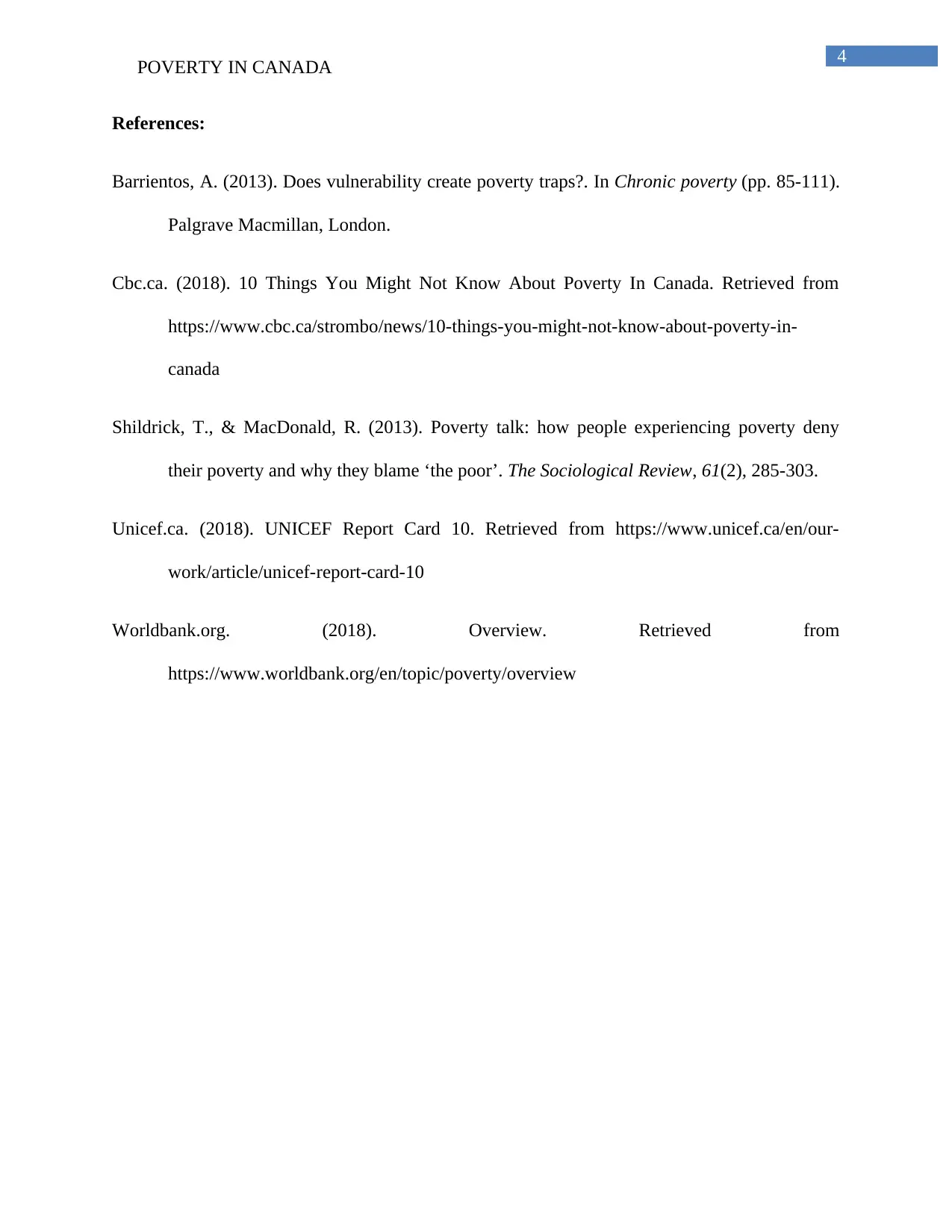
4
POVERTY IN CANADA
References:
Barrientos, A. (2013). Does vulnerability create poverty traps?. In Chronic poverty (pp. 85-111).
Palgrave Macmillan, London.
Cbc.ca. (2018). 10 Things You Might Not Know About Poverty In Canada. Retrieved from
https://www.cbc.ca/strombo/news/10-things-you-might-not-know-about-poverty-in-
canada
Shildrick, T., & MacDonald, R. (2013). Poverty talk: how people experiencing poverty deny
their poverty and why they blame ‘the poor’. The Sociological Review, 61(2), 285-303.
Unicef.ca. (2018). UNICEF Report Card 10. Retrieved from https://www.unicef.ca/en/our-
work/article/unicef-report-card-10
Worldbank.org. (2018). Overview. Retrieved from
https://www.worldbank.org/en/topic/poverty/overview
POVERTY IN CANADA
References:
Barrientos, A. (2013). Does vulnerability create poverty traps?. In Chronic poverty (pp. 85-111).
Palgrave Macmillan, London.
Cbc.ca. (2018). 10 Things You Might Not Know About Poverty In Canada. Retrieved from
https://www.cbc.ca/strombo/news/10-things-you-might-not-know-about-poverty-in-
canada
Shildrick, T., & MacDonald, R. (2013). Poverty talk: how people experiencing poverty deny
their poverty and why they blame ‘the poor’. The Sociological Review, 61(2), 285-303.
Unicef.ca. (2018). UNICEF Report Card 10. Retrieved from https://www.unicef.ca/en/our-
work/article/unicef-report-card-10
Worldbank.org. (2018). Overview. Retrieved from
https://www.worldbank.org/en/topic/poverty/overview
1 out of 5
Related Documents
Your All-in-One AI-Powered Toolkit for Academic Success.
+13062052269
info@desklib.com
Available 24*7 on WhatsApp / Email
![[object Object]](/_next/static/media/star-bottom.7253800d.svg)
Unlock your academic potential
Copyright © 2020–2025 A2Z Services. All Rights Reserved. Developed and managed by ZUCOL.



